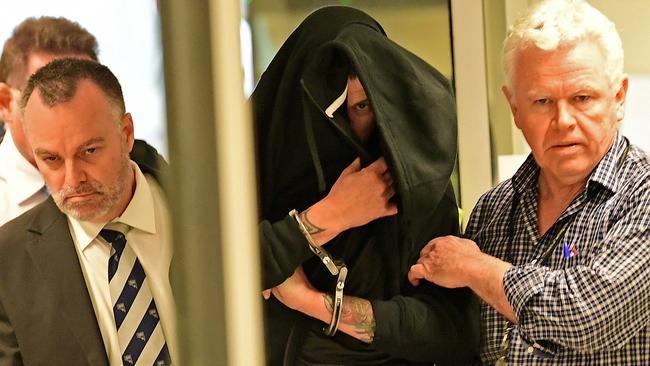‘Broken system’: Laws intended to speed up South Australia’s court system instead causing huge delays as judges and magistrates hit out
CRIMINAL cases will be thrown out and alleged violent offenders released from custody if police and prosecutors continue to take too long finalising charges, courts have warned.
- The first case: 14-month wait for rapist, alleged victim, under new laws
- ‘Justice delayed’ by new efficiency measures, critics claim
- Top prosecutor calls for tough criminal cases to go to DPP over police
- District Court Judge ‘embarrassed’ by delays in SA justice system
CRIMINAL cases will be thrown out and alleged violent offenders released from custody if police and prosecutors continue to take too long finalising charges, courts have warned.
Laws designed to improve court efficiency have instead caused case lists to blow out while law enforcement agencies blame each other for the problem and advocates fear victims are being forgotten.
Victims and prisoners alike currently face waits of more than a year to learn whether prosecutors will upgrade, downgrade, continue with or even drop matters following an arrest.
After eight months under the new laws, judges and magistrates are taking matters into their own hands by refusing long adjournments and granting home detention to violent offenders.
“How do we put pressure on you, and move these matters along, if we don’t consider dismissing charges?” Magistrate Jayanthi McGrath asked last week.

In his judgment on a separate case, Supreme Court Justice Martin Hinton said personal freedom may have been forgotten in the push for efficiency.
“What troubles me is everyone is overlooking liberty … it seems to me here it is a very blunt approach of ‘charge them all, charge them now’,” he said.
“It disturbs me greatly because the wrong charge can have such a devastating consequence, not just for the accused but for the administration of justice and confidence in it.”
The efficiency laws, authored by former Attorney-General John Rau SC, came into effect in March.
Police retain control of cases until a “preliminary brief” of the evidence — including forensic reports and witness statements — has been lodged.
Only then does the Office of the Director of Public Prosecutors determine whether it will take the case and if it refuses, police must decide whether to pursue a lesser charge or drop it.
Last week, Ms McGrath noted “one, maybe two” of the 100 charges in her list had been determined as per the laws, with the rest resulting in lengthy adjournments.
“I just don’t understand — what is the explanation?” she asked.
In another case, police told Magistrate Simon Smart that the DPP would not take over the case without first seeing DNA evidence.
They said Forensic Science SA had estimated that evidence would not be ready for at least 12 months.

“It’s incumbent on the prosecution, if they intend to ask for such extraordinary delays, to satisfy me that the matter cannot be done quicker than 14 months,” Mr Smart replied.
“I will not simply take that on trust — it’s a matter of fairness to all concerned.”
Lawyer Stacey Carter said the efficiency laws had changed nothing.
“What’s the point of the legislation, if it was supposed to fix this problem and has only perpetuated it?” she said.
“Victims want answers and closure, they want outcomes, as much as defendants do and yet they’re left waiting as well.
“This system does not work — it is broken.”
Victims’ Rights Commissioner Bronwyn Killmier said there were flaws in the new system and she was working with a number of agencies to ensure victims were being supported through delays.
“Delaying cases for court efficiency practices in major indictable offences without considering the impact on victims is flawed,” she said.
“Delays in justice can adversely affect victims — any system change needs to take into consideration how victims’ needs will be met, including their safety, keeping them informed as to the progress of the case, consulting with them and how their right to information will be managed.”
A courts spokeswoman said the state’s chief magistrate, Judge Mary-Louise Hribal, felt it was “too early to comment” on the issue.
“Her Honour suggests you touch base with her around Easter, which will be the 12-month mark,” the spokeswoman said.
Director of Public Prosecutions Adam Kimber SC has yet to respond to The Advertiser’s requests for an interview.
CASE ONE
Almost a year after arresting two alleged drug offenders, police ask that the case be postponed a further 22 weeks so they can “negotiate” with Forensic Science SA in the hope key evidence will be “ready by January”. They also flag the possibility of further charges. The court refuses, saying such decisions should have already been made.
CASE TWO
Less than 24 hours after Aaron Donald Carver’s arrest for murder, police ask the court for a 14-month adjournment claiming Forensic Science SA needs “12 months to process DNA results in any and all homicide cases”. The court says murder cases should be the priority and grants only a six-month adjournment.
CASE THREE
An alleged drug and firearm offender, accused of breaching his existing bail, asks for home detention because the case against him will not be finalised for 10 months. The court agrees, calling the delay “disturbing” with the potential for error — which would have “devastating consequences” for the public’s confidence in the justice system.
Previous system
■ Suspect arrested by police, DPP takes over the file.
■ Alleged offender remanded, in custody or on bail, for 10 weeks while police gather evidence for DPP’s consideration.
■ Case returns to court for that evidence, called “declarations”, to be provided to defence counsel, and for magistrates and victims to be updated on its progress.
■ Case adjourned to a further declarations date, if evidence is outstanding, or for an alleged offender to answer the charge.
■ Often, multiple further declarations dates are needed.
■ Magistrates have power to expedite cases or require DPP to file written outlines, while defence can seek to have evidence excluded or lagging cases thrown out.
■ Accused returns to court, enters plea and is remanded to the Supreme or District Court for trial or sentencing.
Current system
■ Suspect arrested by police, who retain conduct of the file.
■ Police tell the court how long it will take to compile a “preliminary brief” of all evidence in the case.
■ Court must give an adjournment of that length and set a timetable to suit. Alleged offender is remanded, on bail or in custody, until that date.
■ Adjourned case remains the responsibility of police until the preliminary brief is complete.
■ DPP can send the preliminary brief file back to police multiple times if they do not consider it complete. Case returns to court on the date chosen by police, the DPP takes control and provides further declarations to defence counsel over subsequent hearings.
■ Alleged offender enters plea and is remanded to face the Supreme or District Court for trial or sentencing.
■ If the case is sent to trial, the DPP has a further six weeks to file a “case statement” with the higher court, and defence has four weeks to respond.
Originally published as ‘Broken system’: Laws intended to speed up South Australia’s court system instead causing huge delays as judges and magistrates hit out
